Please use this identifier to cite or link to this item:
https://hdl.handle.net/11000/35024Full metadata record
| DC Field | Value | Language |
|---|---|---|
| dc.contributor.author | López-Ossorio, Juan J. | - |
| dc.contributor.author | González-Álvarez, José L. | - |
| dc.contributor.author | Loinaz, Ismael | - |
| dc.contributor.author | Martínez Martínez, Ana | - |
| dc.contributor.author | Pineda, David | - |
| dc.contributor.other | Departamentos de la UMH::Psicología de la Salud | es_ES |
| dc.date.accessioned | 2025-01-20T10:43:09Z | - |
| dc.date.available | 2025-01-20T10:43:09Z | - |
| dc.date.created | 2020-09 | - |
| dc.identifier.citation | Psychosocial Intervention (2021) 30(1) 47-55 | es_ES |
| dc.identifier.issn | 1135-0559 | - |
| dc.identifier.uri | https://hdl.handle.net/11000/35024 | - |
| dc.description.abstract | Objective: This study compared the long-term effects of a mindful compassion program on improving depression in lung cancer patients, both in patient-caregiver dyads and in patient-only groups, and examined the moderating roles of anxiety and quality of life (QOL). Method: Participants consisted of 56 dyads, who were randomly assigned to either the dyadic or patient-only groups. Data collection included various assessments at different time points: baseline (T0), end of intervention (T1), and follow-up at the 5th month (T2), 8th month (T3), and 14th month (T4). Results: Patients in the dyadic group experienced a significant reduction in depressive symptoms. The dyadic intervention was particularly beneficial for younger patients and those with higher baseline QOL symptom distress. Improvements in patients’ mindfulness and self-compassion contributed to reduced depression by enhancing general health and lowering anxiety. Additionally, caregivers’ self-compassion played a role in reducing patients’ depression by improving patients’ QOL functioning and decreasing anxiety. Conclusions: Mindfulness and compassion interventions, whether provided dyadically or individually, can be tailored to each patient’s specific condition. | es_ES |
| dc.format | application/pdf | es_ES |
| dc.format.extent | 10 | es_ES |
| dc.language.iso | eng | es_ES |
| dc.publisher | Colegio Oficial de la Psicología de Madrid | es_ES |
| dc.rights | info:eu-repo/semantics/openAccess | es_ES |
| dc.rights | Attribution-NonCommercial-NoDerivatives 4.0 Internacional | * |
| dc.rights.uri | http://creativecommons.org/licenses/by-nc-nd/4.0/ | * |
| dc.subject | Dyadic depression program | es_ES |
| dc.subject | Depressive symptoms | es_ES |
| dc.subject | Anxiety | es_ES |
| dc.subject | Mindfulness awareness | es_ES |
| dc.subject | Self-compassion | es_ES |
| dc.subject.other | CDU::1 - Filosofía y psicología::159.9 - Psicología | es_ES |
| dc.title | Intimate Partner Homicide Risk Assessment by Police in Spain: The Dual Protocol VPR-H | es_ES |
| dc.type | info:eu-repo/semantics/article | es_ES |
| dc.relation.publisherversion | https://doi.org/10.5093/pi2020a16 | es_ES |

View/Open:
Ossorio et al., 2021.pdf
315,96 kB
Adobe PDF
Share:
.png)
